Report on Wider Professional Practice & Development in Education
VerifiedAdded on 2023/06/08
|17
|6190
|110
Report
AI Summary
This report delves into the wider aspects of professional practice and development within the education and training sector. It examines the concept of professionalism, dual professionalism, and how professional values influence practices. The analysis extends to social, political, and economic factors shaping educational policies, and their impact on curriculum and specialized practices. The report also highlights the roles and accountabilities of stakeholders and external bodies, exploring their influence on curriculum design, delivery, and assessment. Furthermore, it discusses organizational policies, quality improvement, self-assessment, and learning programs, emphasizing areas for enhancement to achieve optimal outcomes. This comprehensive overview provides valuable insights into the multifaceted nature of professional development in education and training.
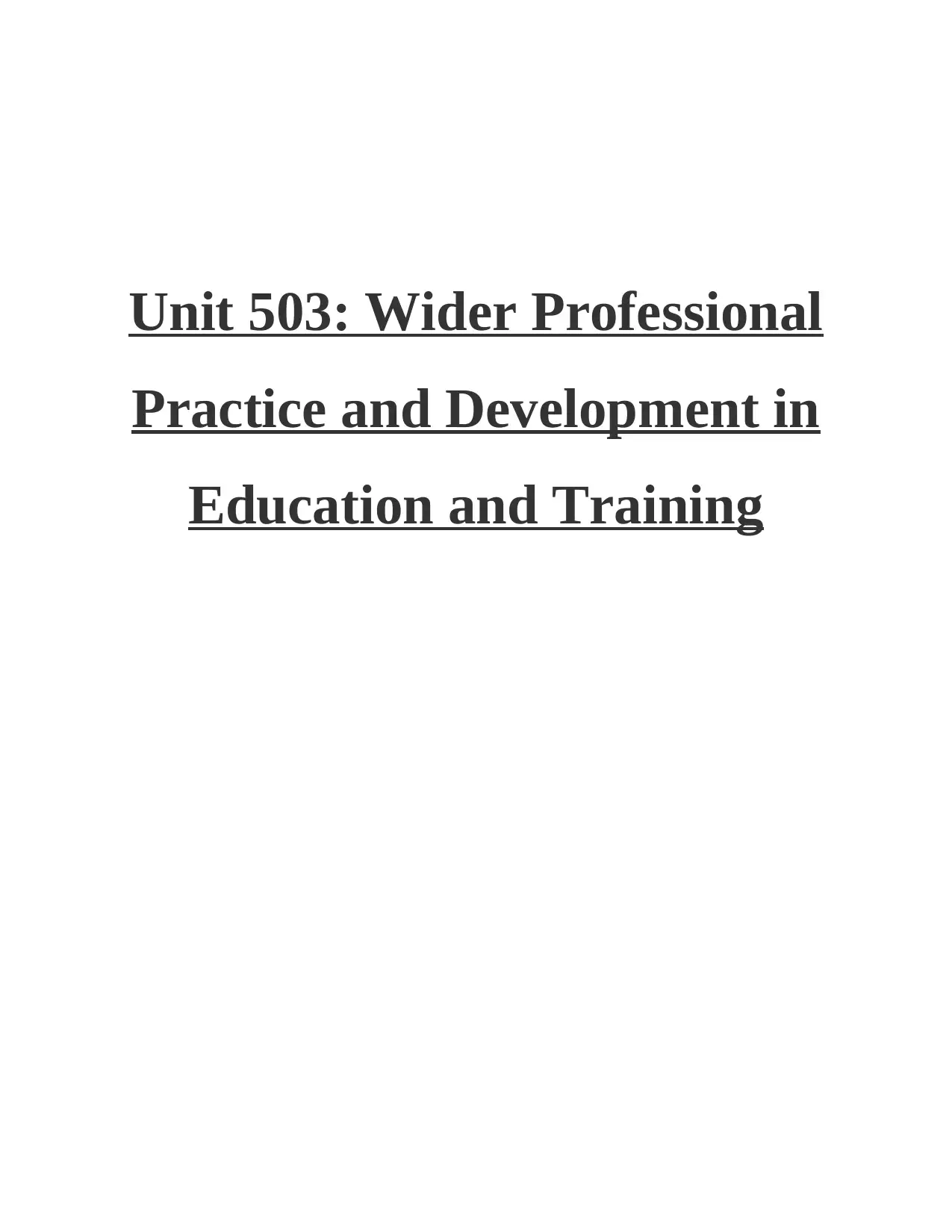
Unit 503: Wider Professional
Practice and Development in
Education and Training
Practice and Development in
Education and Training
Paraphrase This Document
Need a fresh take? Get an instant paraphrase of this document with our AI Paraphraser
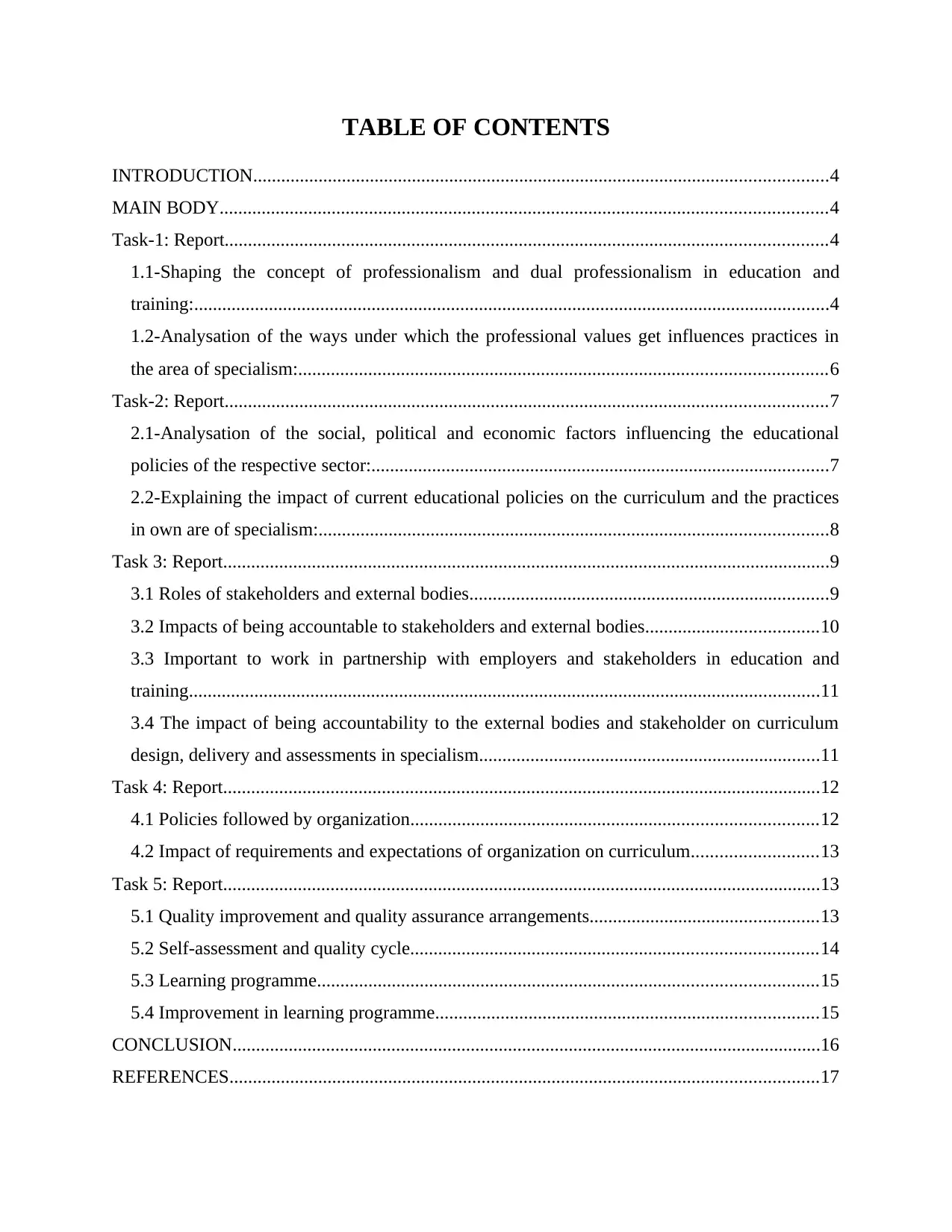
TABLE OF CONTENTS
INTRODUCTION...........................................................................................................................4
MAIN BODY..................................................................................................................................4
Task-1: Report.................................................................................................................................4
1.1-Shaping the concept of professionalism and dual professionalism in education and
training:........................................................................................................................................4
1.2-Analysation of the ways under which the professional values get influences practices in
the area of specialism:.................................................................................................................6
Task-2: Report.................................................................................................................................7
2.1-Analysation of the social, political and economic factors influencing the educational
policies of the respective sector:..................................................................................................7
2.2-Explaining the impact of current educational policies on the curriculum and the practices
in own are of specialism:.............................................................................................................8
Task 3: Report..................................................................................................................................9
3.1 Roles of stakeholders and external bodies.............................................................................9
3.2 Impacts of being accountable to stakeholders and external bodies.....................................10
3.3 Important to work in partnership with employers and stakeholders in education and
training.......................................................................................................................................11
3.4 The impact of being accountability to the external bodies and stakeholder on curriculum
design, delivery and assessments in specialism.........................................................................11
Task 4: Report................................................................................................................................12
4.1 Policies followed by organization.......................................................................................12
4.2 Impact of requirements and expectations of organization on curriculum...........................13
Task 5: Report................................................................................................................................13
5.1 Quality improvement and quality assurance arrangements.................................................13
5.2 Self-assessment and quality cycle.......................................................................................14
5.3 Learning programme...........................................................................................................15
5.4 Improvement in learning programme..................................................................................15
CONCLUSION..............................................................................................................................16
REFERENCES..............................................................................................................................17
INTRODUCTION...........................................................................................................................4
MAIN BODY..................................................................................................................................4
Task-1: Report.................................................................................................................................4
1.1-Shaping the concept of professionalism and dual professionalism in education and
training:........................................................................................................................................4
1.2-Analysation of the ways under which the professional values get influences practices in
the area of specialism:.................................................................................................................6
Task-2: Report.................................................................................................................................7
2.1-Analysation of the social, political and economic factors influencing the educational
policies of the respective sector:..................................................................................................7
2.2-Explaining the impact of current educational policies on the curriculum and the practices
in own are of specialism:.............................................................................................................8
Task 3: Report..................................................................................................................................9
3.1 Roles of stakeholders and external bodies.............................................................................9
3.2 Impacts of being accountable to stakeholders and external bodies.....................................10
3.3 Important to work in partnership with employers and stakeholders in education and
training.......................................................................................................................................11
3.4 The impact of being accountability to the external bodies and stakeholder on curriculum
design, delivery and assessments in specialism.........................................................................11
Task 4: Report................................................................................................................................12
4.1 Policies followed by organization.......................................................................................12
4.2 Impact of requirements and expectations of organization on curriculum...........................13
Task 5: Report................................................................................................................................13
5.1 Quality improvement and quality assurance arrangements.................................................13
5.2 Self-assessment and quality cycle.......................................................................................14
5.3 Learning programme...........................................................................................................15
5.4 Improvement in learning programme..................................................................................15
CONCLUSION..............................................................................................................................16
REFERENCES..............................................................................................................................17
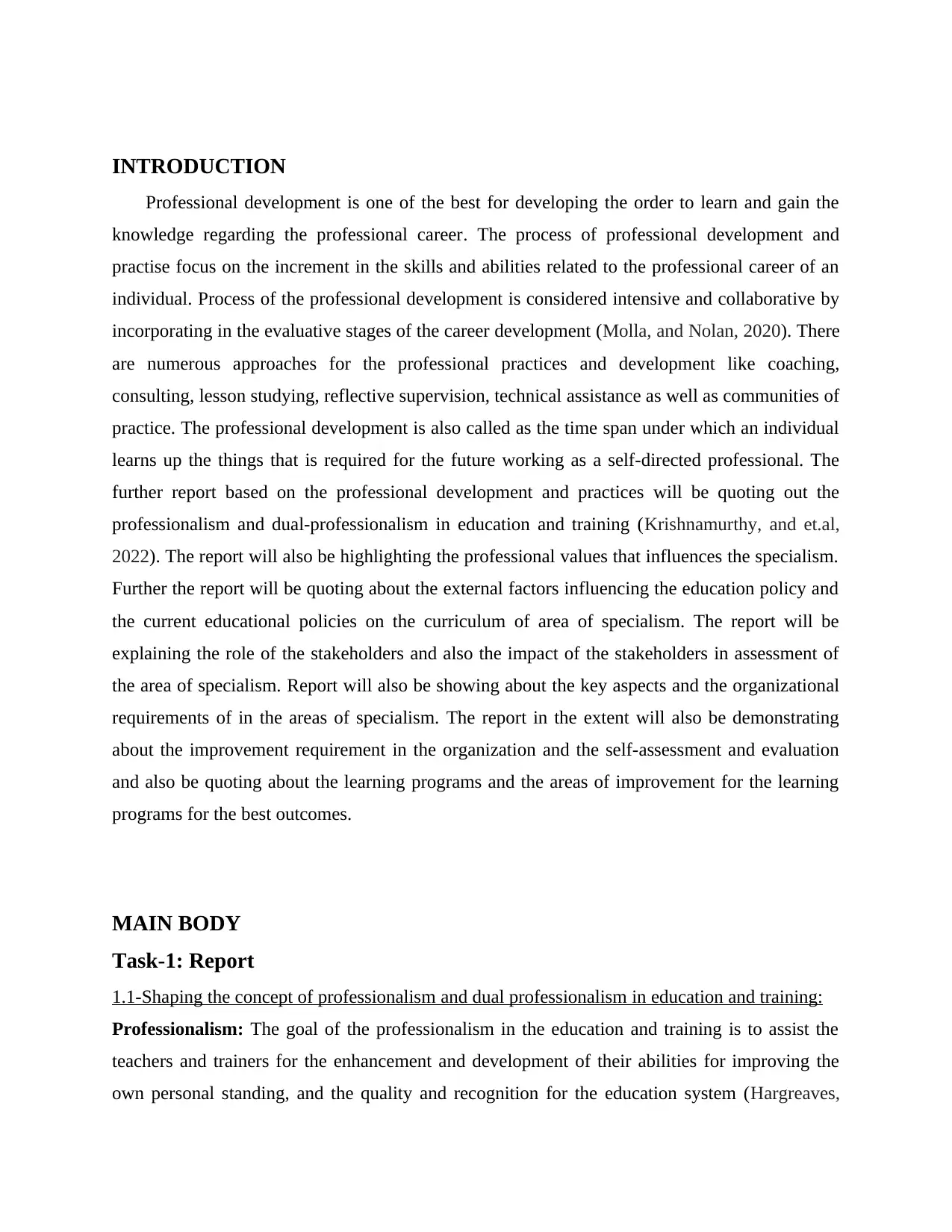
INTRODUCTION
Professional development is one of the best for developing the order to learn and gain the
knowledge regarding the professional career. The process of professional development and
practise focus on the increment in the skills and abilities related to the professional career of an
individual. Process of the professional development is considered intensive and collaborative by
incorporating in the evaluative stages of the career development (Molla, and Nolan, 2020). There
are numerous approaches for the professional practices and development like coaching,
consulting, lesson studying, reflective supervision, technical assistance as well as communities of
practice. The professional development is also called as the time span under which an individual
learns up the things that is required for the future working as a self-directed professional. The
further report based on the professional development and practices will be quoting out the
professionalism and dual-professionalism in education and training (Krishnamurthy, and et.al,
2022). The report will also be highlighting the professional values that influences the specialism.
Further the report will be quoting about the external factors influencing the education policy and
the current educational policies on the curriculum of area of specialism. The report will be
explaining the role of the stakeholders and also the impact of the stakeholders in assessment of
the area of specialism. Report will also be showing about the key aspects and the organizational
requirements of in the areas of specialism. The report in the extent will also be demonstrating
about the improvement requirement in the organization and the self-assessment and evaluation
and also be quoting about the learning programs and the areas of improvement for the learning
programs for the best outcomes.
MAIN BODY
Task-1: Report
1.1-Shaping the concept of professionalism and dual professionalism in education and training:
Professionalism: The goal of the professionalism in the education and training is to assist the
teachers and trainers for the enhancement and development of their abilities for improving the
own personal standing, and the quality and recognition for the education system (Hargreaves,
Professional development is one of the best for developing the order to learn and gain the
knowledge regarding the professional career. The process of professional development and
practise focus on the increment in the skills and abilities related to the professional career of an
individual. Process of the professional development is considered intensive and collaborative by
incorporating in the evaluative stages of the career development (Molla, and Nolan, 2020). There
are numerous approaches for the professional practices and development like coaching,
consulting, lesson studying, reflective supervision, technical assistance as well as communities of
practice. The professional development is also called as the time span under which an individual
learns up the things that is required for the future working as a self-directed professional. The
further report based on the professional development and practices will be quoting out the
professionalism and dual-professionalism in education and training (Krishnamurthy, and et.al,
2022). The report will also be highlighting the professional values that influences the specialism.
Further the report will be quoting about the external factors influencing the education policy and
the current educational policies on the curriculum of area of specialism. The report will be
explaining the role of the stakeholders and also the impact of the stakeholders in assessment of
the area of specialism. Report will also be showing about the key aspects and the organizational
requirements of in the areas of specialism. The report in the extent will also be demonstrating
about the improvement requirement in the organization and the self-assessment and evaluation
and also be quoting about the learning programs and the areas of improvement for the learning
programs for the best outcomes.
MAIN BODY
Task-1: Report
1.1-Shaping the concept of professionalism and dual professionalism in education and training:
Professionalism: The goal of the professionalism in the education and training is to assist the
teachers and trainers for the enhancement and development of their abilities for improving the
own personal standing, and the quality and recognition for the education system (Hargreaves,
⊘ This is a preview!⊘
Do you want full access?
Subscribe today to unlock all pages.

Trusted by 1+ million students worldwide
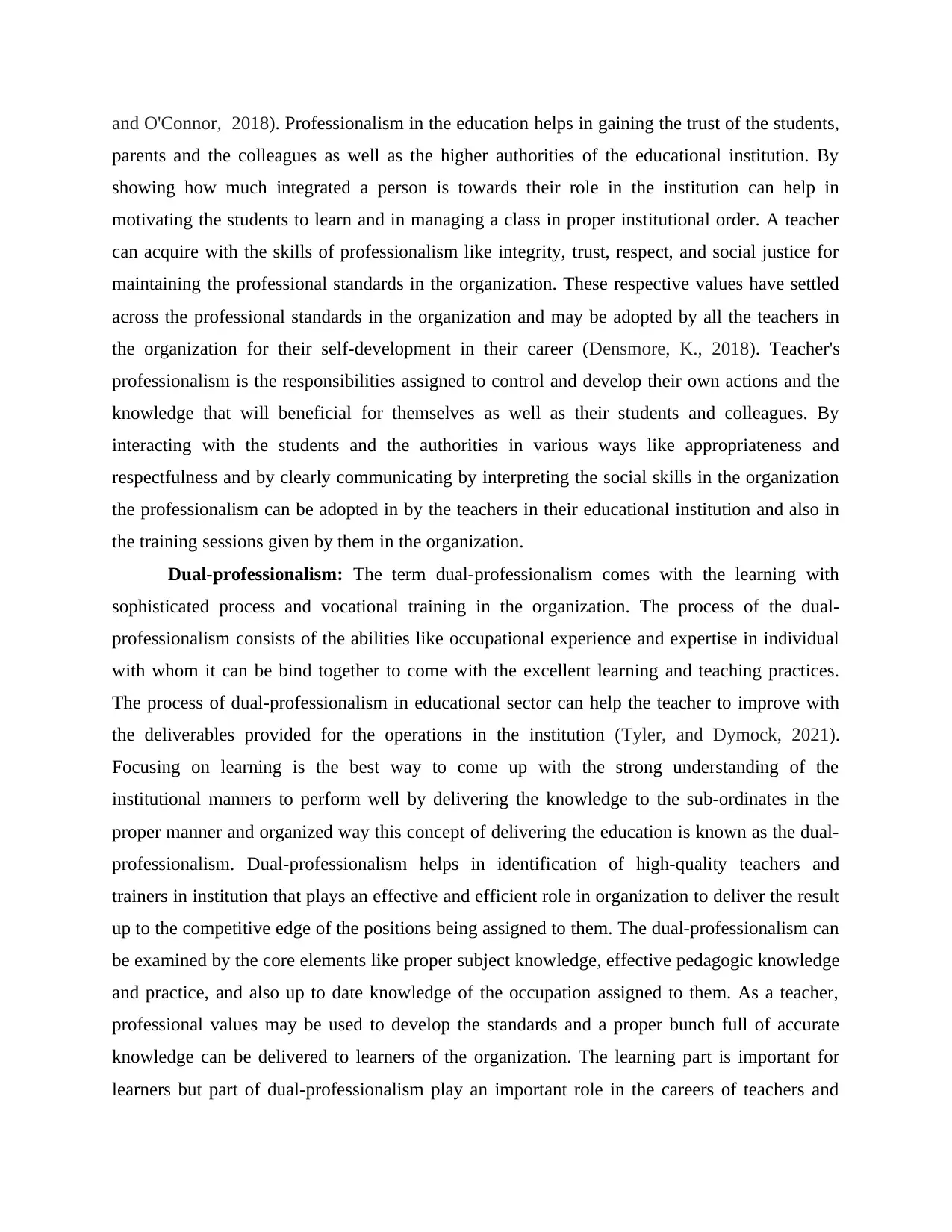
and O'Connor, 2018). Professionalism in the education helps in gaining the trust of the students,
parents and the colleagues as well as the higher authorities of the educational institution. By
showing how much integrated a person is towards their role in the institution can help in
motivating the students to learn and in managing a class in proper institutional order. A teacher
can acquire with the skills of professionalism like integrity, trust, respect, and social justice for
maintaining the professional standards in the organization. These respective values have settled
across the professional standards in the organization and may be adopted by all the teachers in
the organization for their self-development in their career (Densmore, K., 2018). Teacher's
professionalism is the responsibilities assigned to control and develop their own actions and the
knowledge that will beneficial for themselves as well as their students and colleagues. By
interacting with the students and the authorities in various ways like appropriateness and
respectfulness and by clearly communicating by interpreting the social skills in the organization
the professionalism can be adopted in by the teachers in their educational institution and also in
the training sessions given by them in the organization.
Dual-professionalism: The term dual-professionalism comes with the learning with
sophisticated process and vocational training in the organization. The process of the dual-
professionalism consists of the abilities like occupational experience and expertise in individual
with whom it can be bind together to come with the excellent learning and teaching practices.
The process of dual-professionalism in educational sector can help the teacher to improve with
the deliverables provided for the operations in the institution (Tyler, and Dymock, 2021).
Focusing on learning is the best way to come up with the strong understanding of the
institutional manners to perform well by delivering the knowledge to the sub-ordinates in the
proper manner and organized way this concept of delivering the education is known as the dual-
professionalism. Dual-professionalism helps in identification of high-quality teachers and
trainers in institution that plays an effective and efficient role in organization to deliver the result
up to the competitive edge of the positions being assigned to them. The dual-professionalism can
be examined by the core elements like proper subject knowledge, effective pedagogic knowledge
and practice, and also up to date knowledge of the occupation assigned to them. As a teacher,
professional values may be used to develop the standards and a proper bunch full of accurate
knowledge can be delivered to learners of the organization. The learning part is important for
learners but part of dual-professionalism play an important role in the careers of teachers and
parents and the colleagues as well as the higher authorities of the educational institution. By
showing how much integrated a person is towards their role in the institution can help in
motivating the students to learn and in managing a class in proper institutional order. A teacher
can acquire with the skills of professionalism like integrity, trust, respect, and social justice for
maintaining the professional standards in the organization. These respective values have settled
across the professional standards in the organization and may be adopted by all the teachers in
the organization for their self-development in their career (Densmore, K., 2018). Teacher's
professionalism is the responsibilities assigned to control and develop their own actions and the
knowledge that will beneficial for themselves as well as their students and colleagues. By
interacting with the students and the authorities in various ways like appropriateness and
respectfulness and by clearly communicating by interpreting the social skills in the organization
the professionalism can be adopted in by the teachers in their educational institution and also in
the training sessions given by them in the organization.
Dual-professionalism: The term dual-professionalism comes with the learning with
sophisticated process and vocational training in the organization. The process of the dual-
professionalism consists of the abilities like occupational experience and expertise in individual
with whom it can be bind together to come with the excellent learning and teaching practices.
The process of dual-professionalism in educational sector can help the teacher to improve with
the deliverables provided for the operations in the institution (Tyler, and Dymock, 2021).
Focusing on learning is the best way to come up with the strong understanding of the
institutional manners to perform well by delivering the knowledge to the sub-ordinates in the
proper manner and organized way this concept of delivering the education is known as the dual-
professionalism. Dual-professionalism helps in identification of high-quality teachers and
trainers in institution that plays an effective and efficient role in organization to deliver the result
up to the competitive edge of the positions being assigned to them. The dual-professionalism can
be examined by the core elements like proper subject knowledge, effective pedagogic knowledge
and practice, and also up to date knowledge of the occupation assigned to them. As a teacher,
professional values may be used to develop the standards and a proper bunch full of accurate
knowledge can be delivered to learners of the organization. The learning part is important for
learners but part of dual-professionalism play an important role in the careers of teachers and
Paraphrase This Document
Need a fresh take? Get an instant paraphrase of this document with our AI Paraphraser
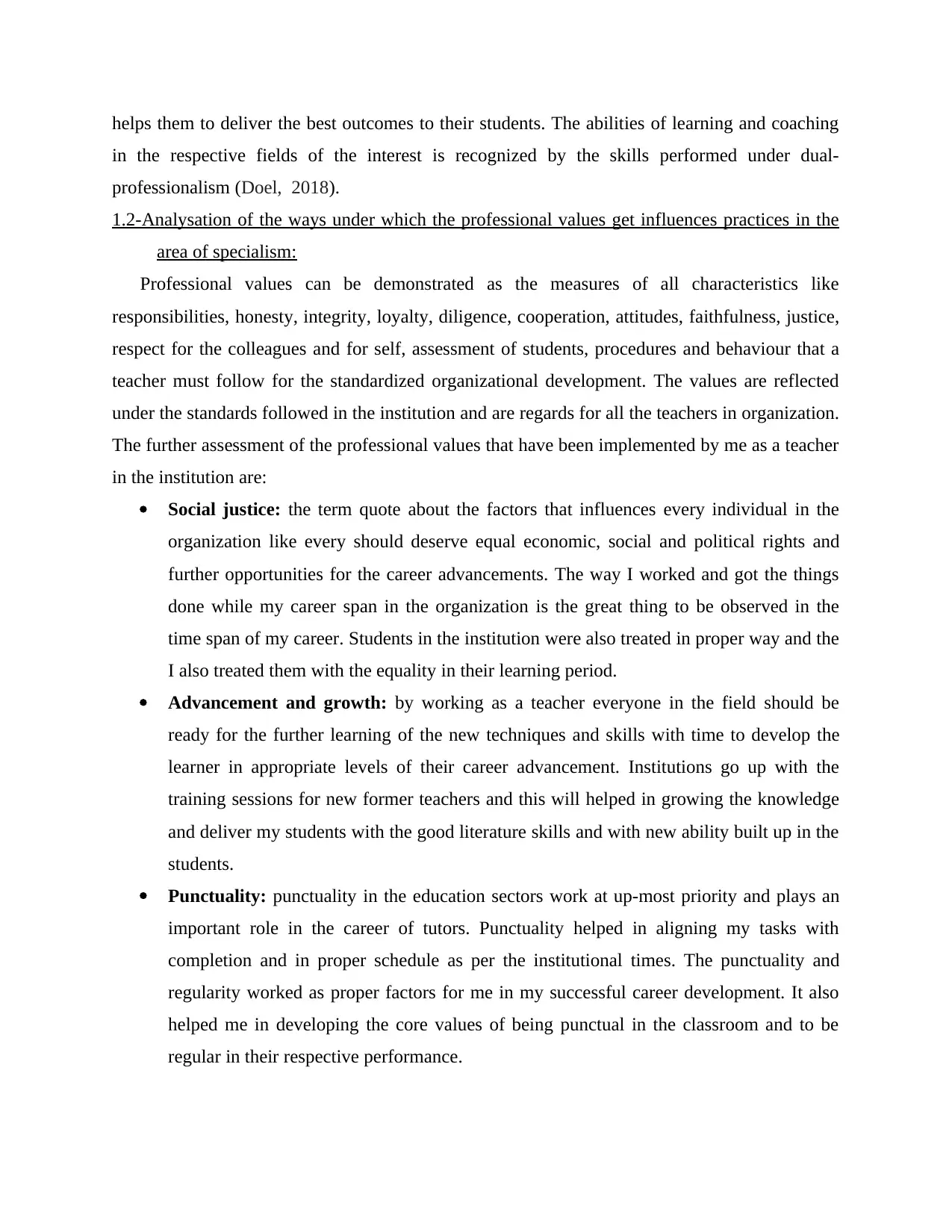
helps them to deliver the best outcomes to their students. The abilities of learning and coaching
in the respective fields of the interest is recognized by the skills performed under dual-
professionalism (Doel, 2018).
1.2-Analysation of the ways under which the professional values get influences practices in the
area of specialism:
Professional values can be demonstrated as the measures of all characteristics like
responsibilities, honesty, integrity, loyalty, diligence, cooperation, attitudes, faithfulness, justice,
respect for the colleagues and for self, assessment of students, procedures and behaviour that a
teacher must follow for the standardized organizational development. The values are reflected
under the standards followed in the institution and are regards for all the teachers in organization.
The further assessment of the professional values that have been implemented by me as a teacher
in the institution are:
Social justice: the term quote about the factors that influences every individual in the
organization like every should deserve equal economic, social and political rights and
further opportunities for the career advancements. The way I worked and got the things
done while my career span in the organization is the great thing to be observed in the
time span of my career. Students in the institution were also treated in proper way and the
I also treated them with the equality in their learning period.
Advancement and growth: by working as a teacher everyone in the field should be
ready for the further learning of the new techniques and skills with time to develop the
learner in appropriate levels of their career advancement. Institutions go up with the
training sessions for new former teachers and this will helped in growing the knowledge
and deliver my students with the good literature skills and with new ability built up in the
students.
Punctuality: punctuality in the education sectors work at up-most priority and plays an
important role in the career of tutors. Punctuality helped in aligning my tasks with
completion and in proper schedule as per the institutional times. The punctuality and
regularity worked as proper factors for me in my successful career development. It also
helped me in developing the core values of being punctual in the classroom and to be
regular in their respective performance.
in the respective fields of the interest is recognized by the skills performed under dual-
professionalism (Doel, 2018).
1.2-Analysation of the ways under which the professional values get influences practices in the
area of specialism:
Professional values can be demonstrated as the measures of all characteristics like
responsibilities, honesty, integrity, loyalty, diligence, cooperation, attitudes, faithfulness, justice,
respect for the colleagues and for self, assessment of students, procedures and behaviour that a
teacher must follow for the standardized organizational development. The values are reflected
under the standards followed in the institution and are regards for all the teachers in organization.
The further assessment of the professional values that have been implemented by me as a teacher
in the institution are:
Social justice: the term quote about the factors that influences every individual in the
organization like every should deserve equal economic, social and political rights and
further opportunities for the career advancements. The way I worked and got the things
done while my career span in the organization is the great thing to be observed in the
time span of my career. Students in the institution were also treated in proper way and the
I also treated them with the equality in their learning period.
Advancement and growth: by working as a teacher everyone in the field should be
ready for the further learning of the new techniques and skills with time to develop the
learner in appropriate levels of their career advancement. Institutions go up with the
training sessions for new former teachers and this will helped in growing the knowledge
and deliver my students with the good literature skills and with new ability built up in the
students.
Punctuality: punctuality in the education sectors work at up-most priority and plays an
important role in the career of tutors. Punctuality helped in aligning my tasks with
completion and in proper schedule as per the institutional times. The punctuality and
regularity worked as proper factors for me in my successful career development. It also
helped me in developing the core values of being punctual in the classroom and to be
regular in their respective performance.
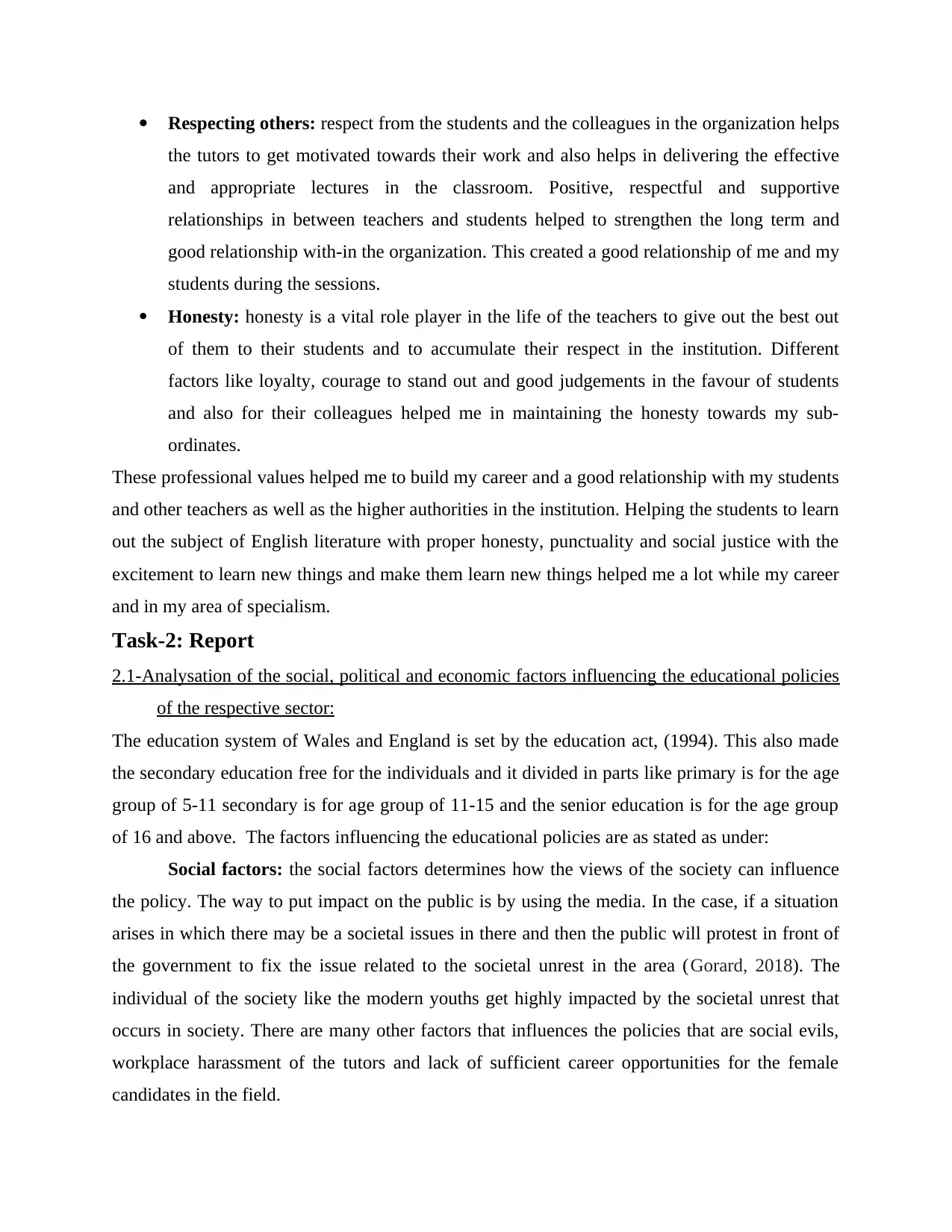
Respecting others: respect from the students and the colleagues in the organization helps
the tutors to get motivated towards their work and also helps in delivering the effective
and appropriate lectures in the classroom. Positive, respectful and supportive
relationships in between teachers and students helped to strengthen the long term and
good relationship with-in the organization. This created a good relationship of me and my
students during the sessions.
Honesty: honesty is a vital role player in the life of the teachers to give out the best out
of them to their students and to accumulate their respect in the institution. Different
factors like loyalty, courage to stand out and good judgements in the favour of students
and also for their colleagues helped me in maintaining the honesty towards my sub-
ordinates.
These professional values helped me to build my career and a good relationship with my students
and other teachers as well as the higher authorities in the institution. Helping the students to learn
out the subject of English literature with proper honesty, punctuality and social justice with the
excitement to learn new things and make them learn new things helped me a lot while my career
and in my area of specialism.
Task-2: Report
2.1-Analysation of the social, political and economic factors influencing the educational policies
of the respective sector:
The education system of Wales and England is set by the education act, (1994). This also made
the secondary education free for the individuals and it divided in parts like primary is for the age
group of 5-11 secondary is for age group of 11-15 and the senior education is for the age group
of 16 and above. The factors influencing the educational policies are as stated as under:
Social factors: the social factors determines how the views of the society can influence
the policy. The way to put impact on the public is by using the media. In the case, if a situation
arises in which there may be a societal issues in there and then the public will protest in front of
the government to fix the issue related to the societal unrest in the area (Gorard, 2018). The
individual of the society like the modern youths get highly impacted by the societal unrest that
occurs in society. There are many other factors that influences the policies that are social evils,
workplace harassment of the tutors and lack of sufficient career opportunities for the female
candidates in the field.
the tutors to get motivated towards their work and also helps in delivering the effective
and appropriate lectures in the classroom. Positive, respectful and supportive
relationships in between teachers and students helped to strengthen the long term and
good relationship with-in the organization. This created a good relationship of me and my
students during the sessions.
Honesty: honesty is a vital role player in the life of the teachers to give out the best out
of them to their students and to accumulate their respect in the institution. Different
factors like loyalty, courage to stand out and good judgements in the favour of students
and also for their colleagues helped me in maintaining the honesty towards my sub-
ordinates.
These professional values helped me to build my career and a good relationship with my students
and other teachers as well as the higher authorities in the institution. Helping the students to learn
out the subject of English literature with proper honesty, punctuality and social justice with the
excitement to learn new things and make them learn new things helped me a lot while my career
and in my area of specialism.
Task-2: Report
2.1-Analysation of the social, political and economic factors influencing the educational policies
of the respective sector:
The education system of Wales and England is set by the education act, (1994). This also made
the secondary education free for the individuals and it divided in parts like primary is for the age
group of 5-11 secondary is for age group of 11-15 and the senior education is for the age group
of 16 and above. The factors influencing the educational policies are as stated as under:
Social factors: the social factors determines how the views of the society can influence
the policy. The way to put impact on the public is by using the media. In the case, if a situation
arises in which there may be a societal issues in there and then the public will protest in front of
the government to fix the issue related to the societal unrest in the area (Gorard, 2018). The
individual of the society like the modern youths get highly impacted by the societal unrest that
occurs in society. There are many other factors that influences the policies that are social evils,
workplace harassment of the tutors and lack of sufficient career opportunities for the female
candidates in the field.
⊘ This is a preview!⊘
Do you want full access?
Subscribe today to unlock all pages.

Trusted by 1+ million students worldwide
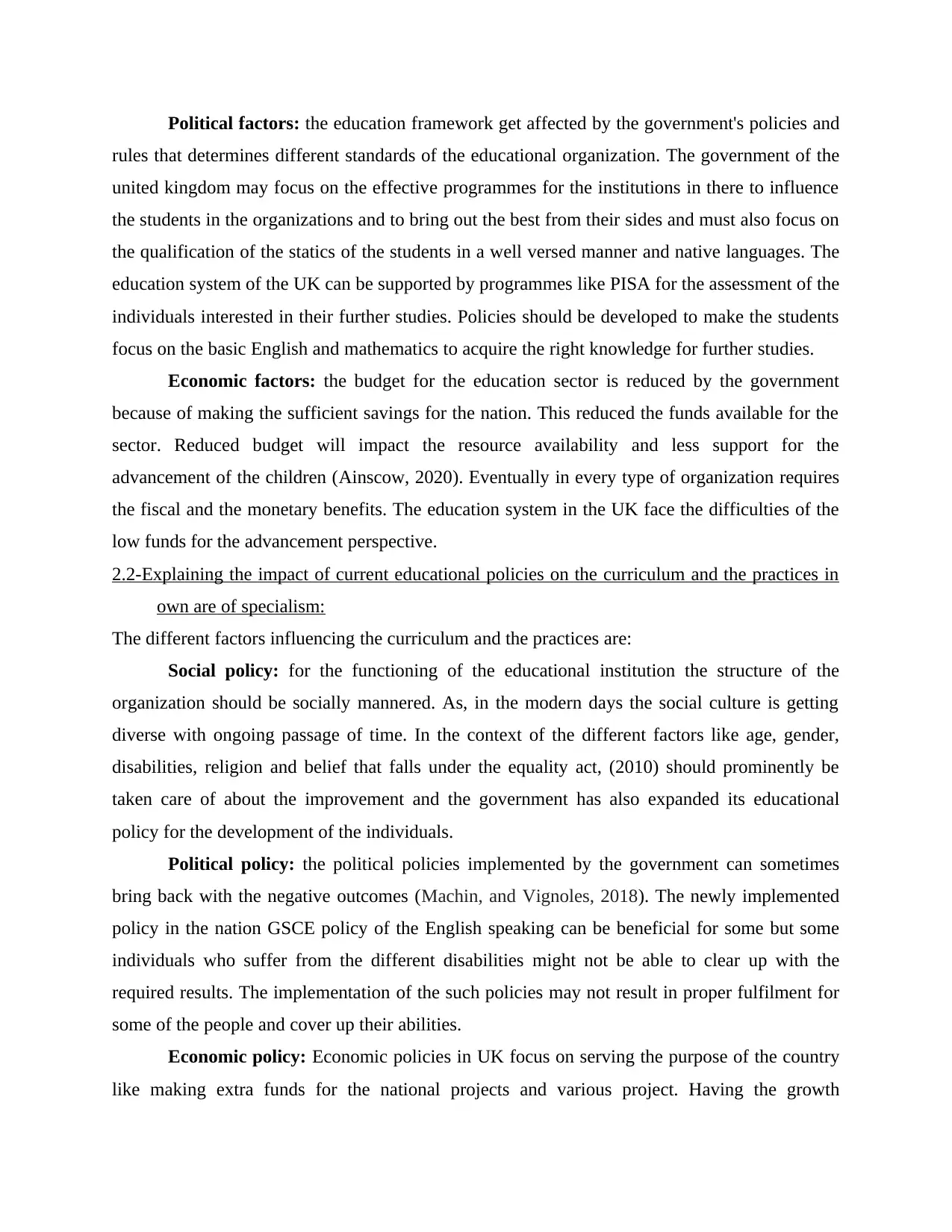
Political factors: the education framework get affected by the government's policies and
rules that determines different standards of the educational organization. The government of the
united kingdom may focus on the effective programmes for the institutions in there to influence
the students in the organizations and to bring out the best from their sides and must also focus on
the qualification of the statics of the students in a well versed manner and native languages. The
education system of the UK can be supported by programmes like PISA for the assessment of the
individuals interested in their further studies. Policies should be developed to make the students
focus on the basic English and mathematics to acquire the right knowledge for further studies.
Economic factors: the budget for the education sector is reduced by the government
because of making the sufficient savings for the nation. This reduced the funds available for the
sector. Reduced budget will impact the resource availability and less support for the
advancement of the children (Ainscow, 2020). Eventually in every type of organization requires
the fiscal and the monetary benefits. The education system in the UK face the difficulties of the
low funds for the advancement perspective.
2.2-Explaining the impact of current educational policies on the curriculum and the practices in
own are of specialism:
The different factors influencing the curriculum and the practices are:
Social policy: for the functioning of the educational institution the structure of the
organization should be socially mannered. As, in the modern days the social culture is getting
diverse with ongoing passage of time. In the context of the different factors like age, gender,
disabilities, religion and belief that falls under the equality act, (2010) should prominently be
taken care of about the improvement and the government has also expanded its educational
policy for the development of the individuals.
Political policy: the political policies implemented by the government can sometimes
bring back with the negative outcomes (Machin, and Vignoles, 2018). The newly implemented
policy in the nation GSCE policy of the English speaking can be beneficial for some but some
individuals who suffer from the different disabilities might not be able to clear up with the
required results. The implementation of the such policies may not result in proper fulfilment for
some of the people and cover up their abilities.
Economic policy: Economic policies in UK focus on serving the purpose of the country
like making extra funds for the national projects and various project. Having the growth
rules that determines different standards of the educational organization. The government of the
united kingdom may focus on the effective programmes for the institutions in there to influence
the students in the organizations and to bring out the best from their sides and must also focus on
the qualification of the statics of the students in a well versed manner and native languages. The
education system of the UK can be supported by programmes like PISA for the assessment of the
individuals interested in their further studies. Policies should be developed to make the students
focus on the basic English and mathematics to acquire the right knowledge for further studies.
Economic factors: the budget for the education sector is reduced by the government
because of making the sufficient savings for the nation. This reduced the funds available for the
sector. Reduced budget will impact the resource availability and less support for the
advancement of the children (Ainscow, 2020). Eventually in every type of organization requires
the fiscal and the monetary benefits. The education system in the UK face the difficulties of the
low funds for the advancement perspective.
2.2-Explaining the impact of current educational policies on the curriculum and the practices in
own are of specialism:
The different factors influencing the curriculum and the practices are:
Social policy: for the functioning of the educational institution the structure of the
organization should be socially mannered. As, in the modern days the social culture is getting
diverse with ongoing passage of time. In the context of the different factors like age, gender,
disabilities, religion and belief that falls under the equality act, (2010) should prominently be
taken care of about the improvement and the government has also expanded its educational
policy for the development of the individuals.
Political policy: the political policies implemented by the government can sometimes
bring back with the negative outcomes (Machin, and Vignoles, 2018). The newly implemented
policy in the nation GSCE policy of the English speaking can be beneficial for some but some
individuals who suffer from the different disabilities might not be able to clear up with the
required results. The implementation of the such policies may not result in proper fulfilment for
some of the people and cover up their abilities.
Economic policy: Economic policies in UK focus on serving the purpose of the country
like making extra funds for the national projects and various project. Having the growth
Paraphrase This Document
Need a fresh take? Get an instant paraphrase of this document with our AI Paraphraser
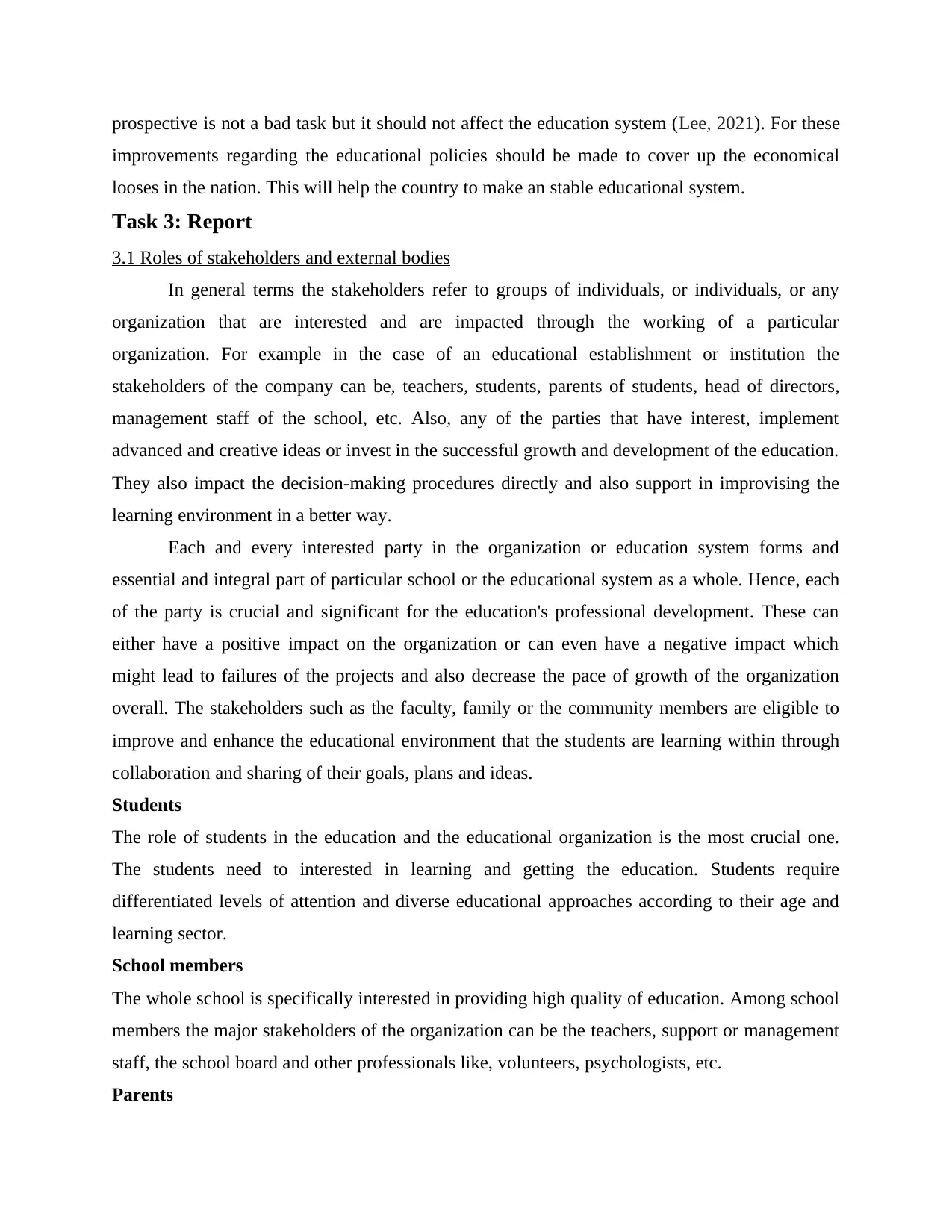
prospective is not a bad task but it should not affect the education system (Lee, 2021). For these
improvements regarding the educational policies should be made to cover up the economical
looses in the nation. This will help the country to make an stable educational system.
Task 3: Report
3.1 Roles of stakeholders and external bodies
In general terms the stakeholders refer to groups of individuals, or individuals, or any
organization that are interested and are impacted through the working of a particular
organization. For example in the case of an educational establishment or institution the
stakeholders of the company can be, teachers, students, parents of students, head of directors,
management staff of the school, etc. Also, any of the parties that have interest, implement
advanced and creative ideas or invest in the successful growth and development of the education.
They also impact the decision-making procedures directly and also support in improvising the
learning environment in a better way.
Each and every interested party in the organization or education system forms and
essential and integral part of particular school or the educational system as a whole. Hence, each
of the party is crucial and significant for the education's professional development. These can
either have a positive impact on the organization or can even have a negative impact which
might lead to failures of the projects and also decrease the pace of growth of the organization
overall. The stakeholders such as the faculty, family or the community members are eligible to
improve and enhance the educational environment that the students are learning within through
collaboration and sharing of their goals, plans and ideas.
Students
The role of students in the education and the educational organization is the most crucial one.
The students need to interested in learning and getting the education. Students require
differentiated levels of attention and diverse educational approaches according to their age and
learning sector.
School members
The whole school is specifically interested in providing high quality of education. Among school
members the major stakeholders of the organization can be the teachers, support or management
staff, the school board and other professionals like, volunteers, psychologists, etc.
Parents
improvements regarding the educational policies should be made to cover up the economical
looses in the nation. This will help the country to make an stable educational system.
Task 3: Report
3.1 Roles of stakeholders and external bodies
In general terms the stakeholders refer to groups of individuals, or individuals, or any
organization that are interested and are impacted through the working of a particular
organization. For example in the case of an educational establishment or institution the
stakeholders of the company can be, teachers, students, parents of students, head of directors,
management staff of the school, etc. Also, any of the parties that have interest, implement
advanced and creative ideas or invest in the successful growth and development of the education.
They also impact the decision-making procedures directly and also support in improvising the
learning environment in a better way.
Each and every interested party in the organization or education system forms and
essential and integral part of particular school or the educational system as a whole. Hence, each
of the party is crucial and significant for the education's professional development. These can
either have a positive impact on the organization or can even have a negative impact which
might lead to failures of the projects and also decrease the pace of growth of the organization
overall. The stakeholders such as the faculty, family or the community members are eligible to
improve and enhance the educational environment that the students are learning within through
collaboration and sharing of their goals, plans and ideas.
Students
The role of students in the education and the educational organization is the most crucial one.
The students need to interested in learning and getting the education. Students require
differentiated levels of attention and diverse educational approaches according to their age and
learning sector.
School members
The whole school is specifically interested in providing high quality of education. Among school
members the major stakeholders of the organization can be the teachers, support or management
staff, the school board and other professionals like, volunteers, psychologists, etc.
Parents
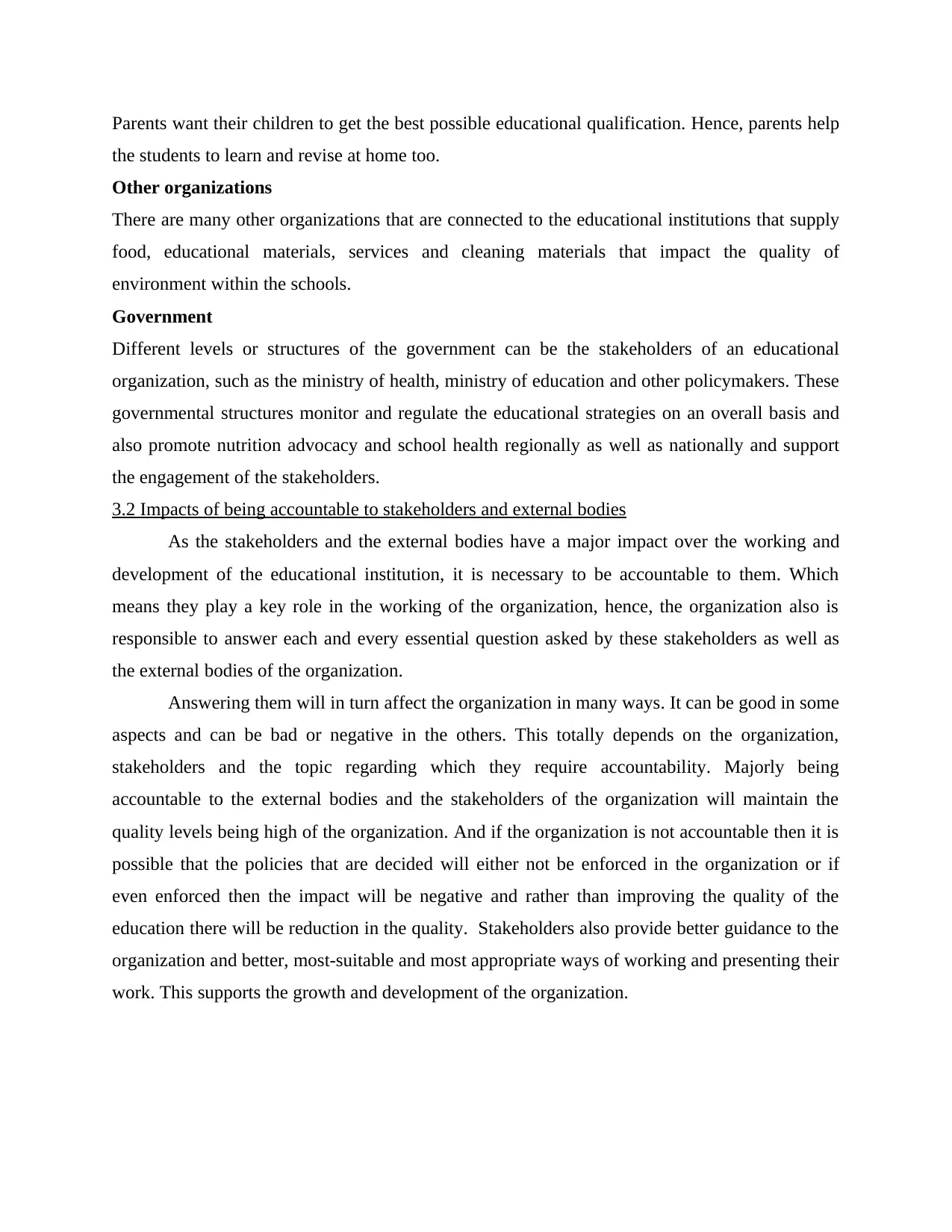
Parents want their children to get the best possible educational qualification. Hence, parents help
the students to learn and revise at home too.
Other organizations
There are many other organizations that are connected to the educational institutions that supply
food, educational materials, services and cleaning materials that impact the quality of
environment within the schools.
Government
Different levels or structures of the government can be the stakeholders of an educational
organization, such as the ministry of health, ministry of education and other policymakers. These
governmental structures monitor and regulate the educational strategies on an overall basis and
also promote nutrition advocacy and school health regionally as well as nationally and support
the engagement of the stakeholders.
3.2 Impacts of being accountable to stakeholders and external bodies
As the stakeholders and the external bodies have a major impact over the working and
development of the educational institution, it is necessary to be accountable to them. Which
means they play a key role in the working of the organization, hence, the organization also is
responsible to answer each and every essential question asked by these stakeholders as well as
the external bodies of the organization.
Answering them will in turn affect the organization in many ways. It can be good in some
aspects and can be bad or negative in the others. This totally depends on the organization,
stakeholders and the topic regarding which they require accountability. Majorly being
accountable to the external bodies and the stakeholders of the organization will maintain the
quality levels being high of the organization. And if the organization is not accountable then it is
possible that the policies that are decided will either not be enforced in the organization or if
even enforced then the impact will be negative and rather than improving the quality of the
education there will be reduction in the quality. Stakeholders also provide better guidance to the
organization and better, most-suitable and most appropriate ways of working and presenting their
work. This supports the growth and development of the organization.
the students to learn and revise at home too.
Other organizations
There are many other organizations that are connected to the educational institutions that supply
food, educational materials, services and cleaning materials that impact the quality of
environment within the schools.
Government
Different levels or structures of the government can be the stakeholders of an educational
organization, such as the ministry of health, ministry of education and other policymakers. These
governmental structures monitor and regulate the educational strategies on an overall basis and
also promote nutrition advocacy and school health regionally as well as nationally and support
the engagement of the stakeholders.
3.2 Impacts of being accountable to stakeholders and external bodies
As the stakeholders and the external bodies have a major impact over the working and
development of the educational institution, it is necessary to be accountable to them. Which
means they play a key role in the working of the organization, hence, the organization also is
responsible to answer each and every essential question asked by these stakeholders as well as
the external bodies of the organization.
Answering them will in turn affect the organization in many ways. It can be good in some
aspects and can be bad or negative in the others. This totally depends on the organization,
stakeholders and the topic regarding which they require accountability. Majorly being
accountable to the external bodies and the stakeholders of the organization will maintain the
quality levels being high of the organization. And if the organization is not accountable then it is
possible that the policies that are decided will either not be enforced in the organization or if
even enforced then the impact will be negative and rather than improving the quality of the
education there will be reduction in the quality. Stakeholders also provide better guidance to the
organization and better, most-suitable and most appropriate ways of working and presenting their
work. This supports the growth and development of the organization.
⊘ This is a preview!⊘
Do you want full access?
Subscribe today to unlock all pages.

Trusted by 1+ million students worldwide
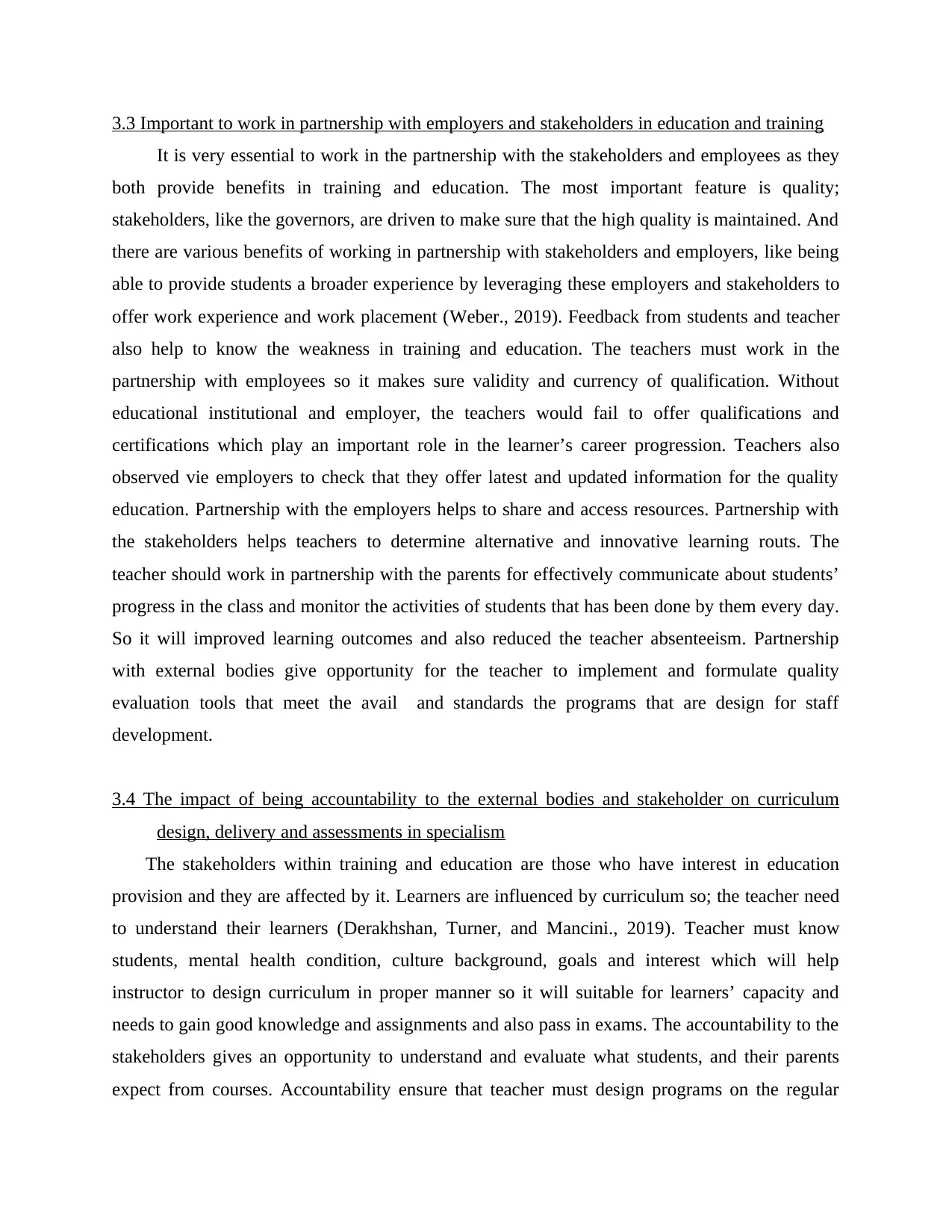
3.3 Important to work in partnership with employers and stakeholders in education and training
It is very essential to work in the partnership with the stakeholders and employees as they
both provide benefits in training and education. The most important feature is quality;
stakeholders, like the governors, are driven to make sure that the high quality is maintained. And
there are various benefits of working in partnership with stakeholders and employers, like being
able to provide students a broader experience by leveraging these employers and stakeholders to
offer work experience and work placement (Weber., 2019). Feedback from students and teacher
also help to know the weakness in training and education. The teachers must work in the
partnership with employees so it makes sure validity and currency of qualification. Without
educational institutional and employer, the teachers would fail to offer qualifications and
certifications which play an important role in the learner’s career progression. Teachers also
observed vie employers to check that they offer latest and updated information for the quality
education. Partnership with the employers helps to share and access resources. Partnership with
the stakeholders helps teachers to determine alternative and innovative learning routs. The
teacher should work in partnership with the parents for effectively communicate about students’
progress in the class and monitor the activities of students that has been done by them every day.
So it will improved learning outcomes and also reduced the teacher absenteeism. Partnership
with external bodies give opportunity for the teacher to implement and formulate quality
evaluation tools that meet the avail and standards the programs that are design for staff
development.
3.4 The impact of being accountability to the external bodies and stakeholder on curriculum
design, delivery and assessments in specialism
The stakeholders within training and education are those who have interest in education
provision and they are affected by it. Learners are influenced by curriculum so; the teacher need
to understand their learners (Derakhshan, Turner, and Mancini., 2019). Teacher must know
students, mental health condition, culture background, goals and interest which will help
instructor to design curriculum in proper manner so it will suitable for learners’ capacity and
needs to gain good knowledge and assignments and also pass in exams. The accountability to the
stakeholders gives an opportunity to understand and evaluate what students, and their parents
expect from courses. Accountability ensure that teacher must design programs on the regular
It is very essential to work in the partnership with the stakeholders and employees as they
both provide benefits in training and education. The most important feature is quality;
stakeholders, like the governors, are driven to make sure that the high quality is maintained. And
there are various benefits of working in partnership with stakeholders and employers, like being
able to provide students a broader experience by leveraging these employers and stakeholders to
offer work experience and work placement (Weber., 2019). Feedback from students and teacher
also help to know the weakness in training and education. The teachers must work in the
partnership with employees so it makes sure validity and currency of qualification. Without
educational institutional and employer, the teachers would fail to offer qualifications and
certifications which play an important role in the learner’s career progression. Teachers also
observed vie employers to check that they offer latest and updated information for the quality
education. Partnership with the employers helps to share and access resources. Partnership with
the stakeholders helps teachers to determine alternative and innovative learning routs. The
teacher should work in partnership with the parents for effectively communicate about students’
progress in the class and monitor the activities of students that has been done by them every day.
So it will improved learning outcomes and also reduced the teacher absenteeism. Partnership
with external bodies give opportunity for the teacher to implement and formulate quality
evaluation tools that meet the avail and standards the programs that are design for staff
development.
3.4 The impact of being accountability to the external bodies and stakeholder on curriculum
design, delivery and assessments in specialism
The stakeholders within training and education are those who have interest in education
provision and they are affected by it. Learners are influenced by curriculum so; the teacher need
to understand their learners (Derakhshan, Turner, and Mancini., 2019). Teacher must know
students, mental health condition, culture background, goals and interest which will help
instructor to design curriculum in proper manner so it will suitable for learners’ capacity and
needs to gain good knowledge and assignments and also pass in exams. The accountability to the
stakeholders gives an opportunity to understand and evaluate what students, and their parents
expect from courses. Accountability ensure that teacher must design programs on the regular
Paraphrase This Document
Need a fresh take? Get an instant paraphrase of this document with our AI Paraphraser
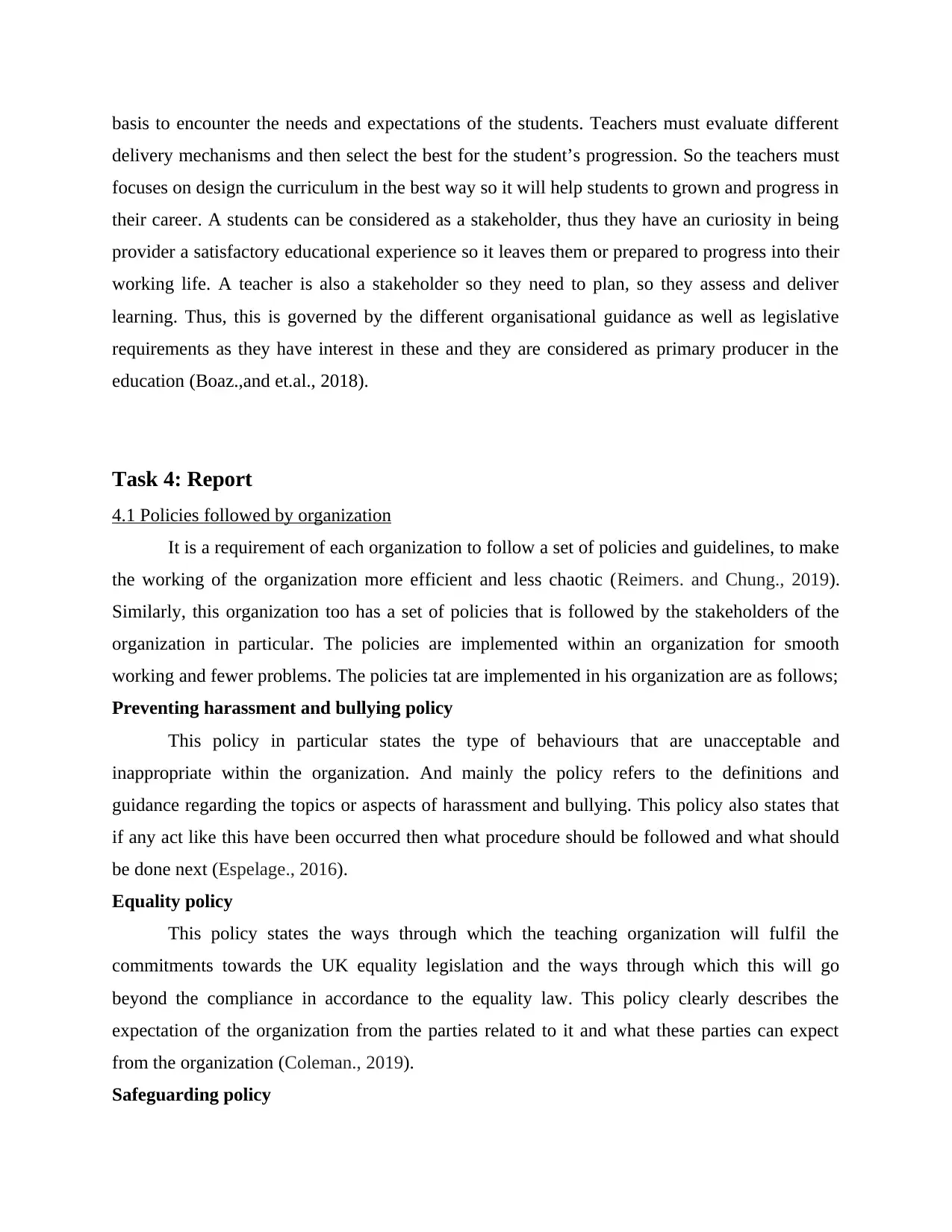
basis to encounter the needs and expectations of the students. Teachers must evaluate different
delivery mechanisms and then select the best for the student’s progression. So the teachers must
focuses on design the curriculum in the best way so it will help students to grown and progress in
their career. A students can be considered as a stakeholder, thus they have an curiosity in being
provider a satisfactory educational experience so it leaves them or prepared to progress into their
working life. A teacher is also a stakeholder so they need to plan, so they assess and deliver
learning. Thus, this is governed by the different organisational guidance as well as legislative
requirements as they have interest in these and they are considered as primary producer in the
education (Boaz.,and et.al., 2018).
Task 4: Report
4.1 Policies followed by organization
It is a requirement of each organization to follow a set of policies and guidelines, to make
the working of the organization more efficient and less chaotic (Reimers. and Chung., 2019).
Similarly, this organization too has a set of policies that is followed by the stakeholders of the
organization in particular. The policies are implemented within an organization for smooth
working and fewer problems. The policies tat are implemented in his organization are as follows;
Preventing harassment and bullying policy
This policy in particular states the type of behaviours that are unacceptable and
inappropriate within the organization. And mainly the policy refers to the definitions and
guidance regarding the topics or aspects of harassment and bullying. This policy also states that
if any act like this have been occurred then what procedure should be followed and what should
be done next (Espelage., 2016).
Equality policy
This policy states the ways through which the teaching organization will fulfil the
commitments towards the UK equality legislation and the ways through which this will go
beyond the compliance in accordance to the equality law. This policy clearly describes the
expectation of the organization from the parties related to it and what these parties can expect
from the organization (Coleman., 2019).
Safeguarding policy
delivery mechanisms and then select the best for the student’s progression. So the teachers must
focuses on design the curriculum in the best way so it will help students to grown and progress in
their career. A students can be considered as a stakeholder, thus they have an curiosity in being
provider a satisfactory educational experience so it leaves them or prepared to progress into their
working life. A teacher is also a stakeholder so they need to plan, so they assess and deliver
learning. Thus, this is governed by the different organisational guidance as well as legislative
requirements as they have interest in these and they are considered as primary producer in the
education (Boaz.,and et.al., 2018).
Task 4: Report
4.1 Policies followed by organization
It is a requirement of each organization to follow a set of policies and guidelines, to make
the working of the organization more efficient and less chaotic (Reimers. and Chung., 2019).
Similarly, this organization too has a set of policies that is followed by the stakeholders of the
organization in particular. The policies are implemented within an organization for smooth
working and fewer problems. The policies tat are implemented in his organization are as follows;
Preventing harassment and bullying policy
This policy in particular states the type of behaviours that are unacceptable and
inappropriate within the organization. And mainly the policy refers to the definitions and
guidance regarding the topics or aspects of harassment and bullying. This policy also states that
if any act like this have been occurred then what procedure should be followed and what should
be done next (Espelage., 2016).
Equality policy
This policy states the ways through which the teaching organization will fulfil the
commitments towards the UK equality legislation and the ways through which this will go
beyond the compliance in accordance to the equality law. This policy clearly describes the
expectation of the organization from the parties related to it and what these parties can expect
from the organization (Coleman., 2019).
Safeguarding policy
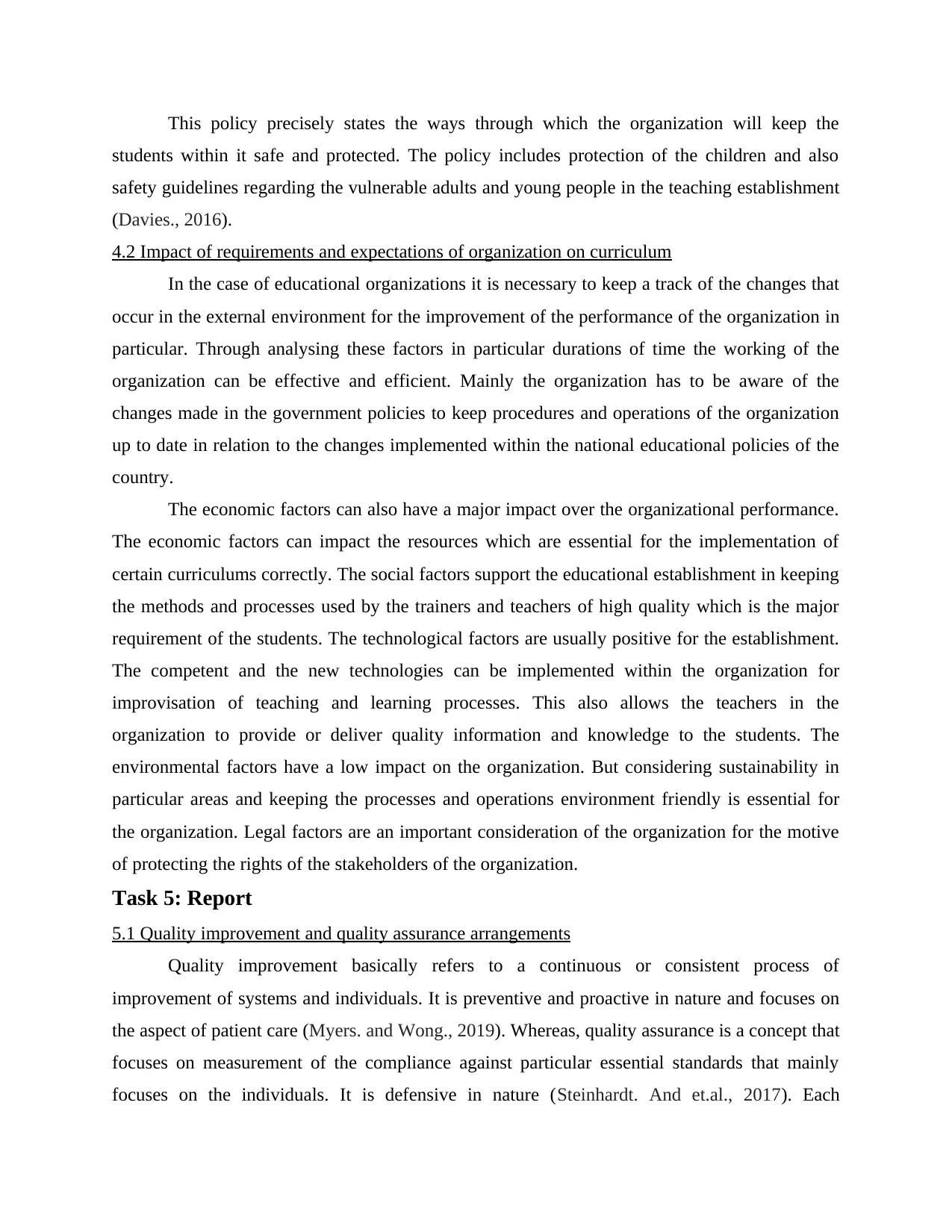
This policy precisely states the ways through which the organization will keep the
students within it safe and protected. The policy includes protection of the children and also
safety guidelines regarding the vulnerable adults and young people in the teaching establishment
(Davies., 2016).
4.2 Impact of requirements and expectations of organization on curriculum
In the case of educational organizations it is necessary to keep a track of the changes that
occur in the external environment for the improvement of the performance of the organization in
particular. Through analysing these factors in particular durations of time the working of the
organization can be effective and efficient. Mainly the organization has to be aware of the
changes made in the government policies to keep procedures and operations of the organization
up to date in relation to the changes implemented within the national educational policies of the
country.
The economic factors can also have a major impact over the organizational performance.
The economic factors can impact the resources which are essential for the implementation of
certain curriculums correctly. The social factors support the educational establishment in keeping
the methods and processes used by the trainers and teachers of high quality which is the major
requirement of the students. The technological factors are usually positive for the establishment.
The competent and the new technologies can be implemented within the organization for
improvisation of teaching and learning processes. This also allows the teachers in the
organization to provide or deliver quality information and knowledge to the students. The
environmental factors have a low impact on the organization. But considering sustainability in
particular areas and keeping the processes and operations environment friendly is essential for
the organization. Legal factors are an important consideration of the organization for the motive
of protecting the rights of the stakeholders of the organization.
Task 5: Report
5.1 Quality improvement and quality assurance arrangements
Quality improvement basically refers to a continuous or consistent process of
improvement of systems and individuals. It is preventive and proactive in nature and focuses on
the aspect of patient care (Myers. and Wong., 2019). Whereas, quality assurance is a concept that
focuses on measurement of the compliance against particular essential standards that mainly
focuses on the individuals. It is defensive in nature (Steinhardt. And et.al., 2017). Each
students within it safe and protected. The policy includes protection of the children and also
safety guidelines regarding the vulnerable adults and young people in the teaching establishment
(Davies., 2016).
4.2 Impact of requirements and expectations of organization on curriculum
In the case of educational organizations it is necessary to keep a track of the changes that
occur in the external environment for the improvement of the performance of the organization in
particular. Through analysing these factors in particular durations of time the working of the
organization can be effective and efficient. Mainly the organization has to be aware of the
changes made in the government policies to keep procedures and operations of the organization
up to date in relation to the changes implemented within the national educational policies of the
country.
The economic factors can also have a major impact over the organizational performance.
The economic factors can impact the resources which are essential for the implementation of
certain curriculums correctly. The social factors support the educational establishment in keeping
the methods and processes used by the trainers and teachers of high quality which is the major
requirement of the students. The technological factors are usually positive for the establishment.
The competent and the new technologies can be implemented within the organization for
improvisation of teaching and learning processes. This also allows the teachers in the
organization to provide or deliver quality information and knowledge to the students. The
environmental factors have a low impact on the organization. But considering sustainability in
particular areas and keeping the processes and operations environment friendly is essential for
the organization. Legal factors are an important consideration of the organization for the motive
of protecting the rights of the stakeholders of the organization.
Task 5: Report
5.1 Quality improvement and quality assurance arrangements
Quality improvement basically refers to a continuous or consistent process of
improvement of systems and individuals. It is preventive and proactive in nature and focuses on
the aspect of patient care (Myers. and Wong., 2019). Whereas, quality assurance is a concept that
focuses on measurement of the compliance against particular essential standards that mainly
focuses on the individuals. It is defensive in nature (Steinhardt. And et.al., 2017). Each
⊘ This is a preview!⊘
Do you want full access?
Subscribe today to unlock all pages.

Trusted by 1+ million students worldwide
1 out of 17
Related Documents
Your All-in-One AI-Powered Toolkit for Academic Success.
+13062052269
info@desklib.com
Available 24*7 on WhatsApp / Email
![[object Object]](/_next/static/media/star-bottom.7253800d.svg)
Unlock your academic potential
Copyright © 2020–2026 A2Z Services. All Rights Reserved. Developed and managed by ZUCOL.
